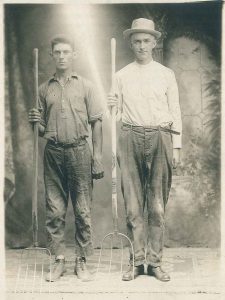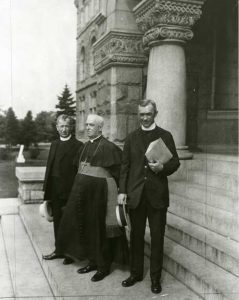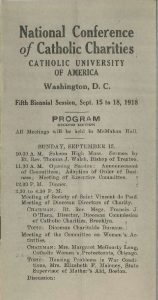
For all of his gregariousness, Monsignor John O’Grady is one of the lesser-known leaders in twentieth century American Catholic history. And yet, he is one of the founders and organizers of what is today known as Catholic Charities, USA, one of the largest charitable organizations in America, and of CARITAS, which carries the mission to serve and advocate for the poor globally.
Like many a priest in the early twentieth-century United States, O’Grady was born in Ireland. “In the beginning there was Ireland,” he once noted, “I smile as I write these words, remembering many of my fellow priests whose behavior from time to time is an assumption that these words are the first words of Genesis.” Indeed, many Irish families of the nineteenth century expected that one of their sons would become a priest, and the O’Gradys were no exception. Upon his birth on March 31st, 1886, Margaret O’Grady later told her son that “then and there” it was decided that young John would be a priest.¹ After attending All Hallows College in Dublin from 1902-1909, O’Grady spent three years serving as Assistant Pastor at the Cathedral in Omaha Nebraska.
O’Grady came from a family of impoverished farmers in County Clare, a circumstance that made him sensitive to the plight of those in similar circumstances in the United States. Even in his earliest years as a priest, his interest in working not only with his parishioners, but with the poorest of Omaha drove him. As he put it, “I had always been very much interested in people and curious about life, and so I found myself sitting around talking to the families which belonged to our parish about many things; their problems, their interests, their hopes, their plans…” Soon, O’Grady found himself frequenting impoverished neighborhoods, courts, juvenile detention homes in search of situations in which he could offer advice and advocacy.²

O’Grady had been told about the work of Monsignor John A. Ryan, the Catholic University professor who had authored an influential book, A Living Wage, and was intensely interested in both the economic and social side of charity. When his Bishop, Richard Scannell, wanted to send O’Grady for further schooling in Germany, O’Grady requested that he send him to The Catholic University of America instead. O’Grady did indeed form an important intellectual relationship with John Ryan at the University, but his first mentor was another professor, sociologist Monsignor William Kerby. Kerby was considered the founder of what was called “scientific charity” in Catholic circles, which is what the emerging profession of social work called training for the field of social work. At the time, the idea of training individuals in sociology, economics and various aspects of charitable care was something that not everyone accepted.
After directing his training in sociology, economics and the social sciences at Catholic University and the University of Chicago, Monsignor Kerby set O’Grady to the work of coordinating members of the local Catholic charitable groups, particularly the St. Vincent de Paul Societies, in cities throughout the United States. Monsignor John J. Butler, of Catholic Charities of St. Louis Missouri was a particularly good mentor for O’Grady, who claimed that Butler “is a man who knows how to get things done and he does it quietly.” Bishop Thomas Shahan, Rector of Catholic University, was also a crucial supporter, as were lay Vincent de Paul charity workers Thomas Mulry and Edmond Butler, and Rev. D.J. McMahon of New York.³
Collectively, this group was instrumental in forming the core of the National Conference of Catholic Charities, renamed Catholic Charities, USA in 1986. Over the next decade the NCCC grew into an association of lay volunteers, and to a lesser extent, professional social workers and clergy. Catholic laywomen dominated the early membership, while the leadership was comprised of members of the St. Vincent de Paul Society.

While the organization’s first president, Shahan, and its first secretary, Kerby, were instrumental in laying out the broader goals of the NCCC, O’Grady, was more aggressive and strategic in his leadership of NCCC. Kerby was courteous and reticent about his role in the establishment of the national organization, and maintained strong organizational relationships with the early leadership and lay volunteers of NCCC. O’Grady, who served as secretary in 1920 and remained at the helm of the NCCC for the next 41 years, sought to extend its influence through further cultivation of professional charity workers and the strengthening of the diocesan branches. A central figure in the professionalization of Catholic social workers, he promoted the establishment of the Catholic University School of Social Work to train them, serving as its first dean from 1934 until 1938. O’Grady, moreover, actively sought to exercise influence in government where public policy affecting Catholic charity was concerned, meeting with countless government figures on issues related to child welfare, housing, and rural poverty. By the time he left the helm of the NCCC in 1961, the organization was a national force in charity work and offered an authoritative voice in public welfare policy. It remains that today.
A finding aid for the papers of Monsignor John O’Grady can be found here.
A finding aid for the papers Monsignor William Kerby can be found here.
A finding aid for the papers of Bishop Thomas Shahan can be found here.
A finding aid for the records of Catholic Charities USA can be found here.
¹Quote from “Come Now, Monsignor,” unpublished memoir of O’Grady by Saul Alinsky, Monsignor John O’Grady Papers, chapter 1, p. 1, box 22, folder 6, American Catholic History Research Center and University Archives.
²“Come Now, Monsignor,” pps. 19, 24.
³“Come Now, Monsignor,” chapter 4, p. 2; see also Dorothy Brown and Elizabeth McKeown, The Poor Belong to Us; Catholic Charities and American Welfare (Harvard University Press, 1997).
